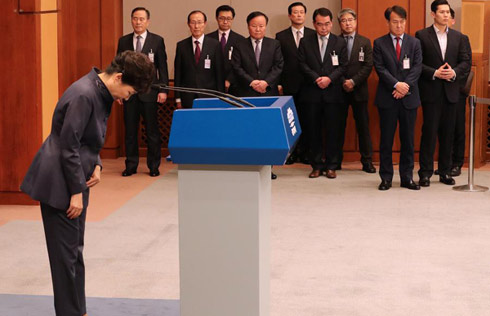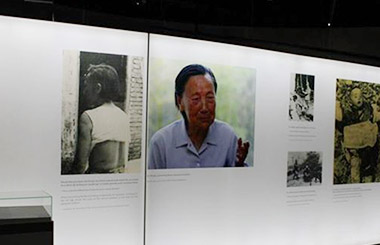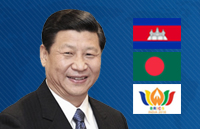Launch propels ROK into space age
![The Korea Space Launch Vehicle-1 or Naro, is launched at Naro Space Center in Goheung, about 480 km south of Seoul on Wednesday. The Republic of Korea launched its fi rst space rocket carrying a science satellite amid heightened regional tensions, caused in part by Pyongyang's successful launch of its own rocket last month. [SEO MYONG-GON / YONHAP VIA REUTERS] Launch propels ROK into space age](../../images/attachement/jpg/site1/20130131/00221917dead1273e95411.jpg) |
|
The Korea Space Launch Vehicle-1 or Naro, is launched at Naro Space Center in Goheung, about 480 km south of Seoul on Wednesday. The Republic of Korea launched its fi rst space rocket carrying a science satellite amid heightened regional tensions, caused in part by Pyongyang's successful launch of its own rocket last month. [SEO MYONG-GON / YONHAP VIA REUTERS] |
The Republic of Korea successfully sent its first rocket into orbit on Wednesday, becoming a member of the global space club.
But experts said Seoul must become less dependent on foreign space technology.
The 140-ton Korea Space Launch Vehicle-1, also known as Naro, blasted off at 3 pm Beijing time from the Naro Space Center, about 480 km south of Seoul.
The vehicle reached its target altitude nine minutes later and deployed a satellite, Yonhap News Agency cited officials from the Korea Aerospace Research Institute as saying.
"The launch of the rocket itself succeeded," an official told the agency.
A final judgment on the success of the launch will be made on Thursday, when the satellite makes its first contact with the ROK's ground station at the Korea Advanced Institute of Science and Technology in Daejeon, 160 km south of Seoul.
The launch was the country's third attempt, after the first two ended in failure in 2009 and 2010. Seoul had planned to fire the rocket last year on Oct 26, and again on Nov 29, but both launches were delayed because of technical problems.
The hard-won success means the ROK has come one step closer to realizing its long-held ambition, but there is still a long road ahead for Seoul, because the core technology of Naro has not been developed by the ROK, observers and media said.
The successful launch would be a huge boost for the ROK — a late entrant into the costly world of space technology and exploration — which is desperate to get its commercial launch program up and running, said the Tokyo-based news website Japan Today.
Sending up a satellite will help Seoul's intelligence-gathering ability, which means stronger defense capability, said Zhang Liangui, a professor on Korean Peninsula studies at the Party School of the Communist Party of China Central Committee.
"With the information gathered by the satellites, the ROK can better know the situation of military and nuclear facilities in its northern neighbor — the Democratic People's Republic of Korea," he added.
"But we cannot say Seoul has mastered the core technology with this launch, because the Naro still uses Russian space technology," Zhang said.
The first stage of Naro, which includes the core technology of the rocket, is manufactured by Russia's Khrunichev State Research and Production Space Center, and Moscow refused to transfer the know-how to Seoul.
"Despite the success, the ROK can hardly do away with Russia's help," said Li Daguang, a professor at the University of National Defense of China.
But there is more room for ROK-Russia space cooperation as Seoul has been negotiating with Moscow to take advanced defense technology as part of Russia's debt repayments to Seoul, said Hong Kong-based Phoenix TV.
Despite a very successful satellite construction program, it faces a long road to catch up with the other Asian powers with proven launch capability — China, Japan and India, said Phoenix TV.
Seoul is planning to develop an indigenous rocket with a 10-ton thrust engine by 2016, followed by a 75-ton thrust engine in 2018 and a 300-ton thrust space rocket carrying a 1.5-ton satellite 2021, Yonhap reported.
Developing space technology independently is necessary for a country's national defense, especially the ROK, said Li, the military expert, because it means Seoul will decrease its overdependence on Washington for possible safety threats.
Contact the writers at zhouwa@chinadaily.com.cn and zhaoshengnan@chinadaily.com.cn


















